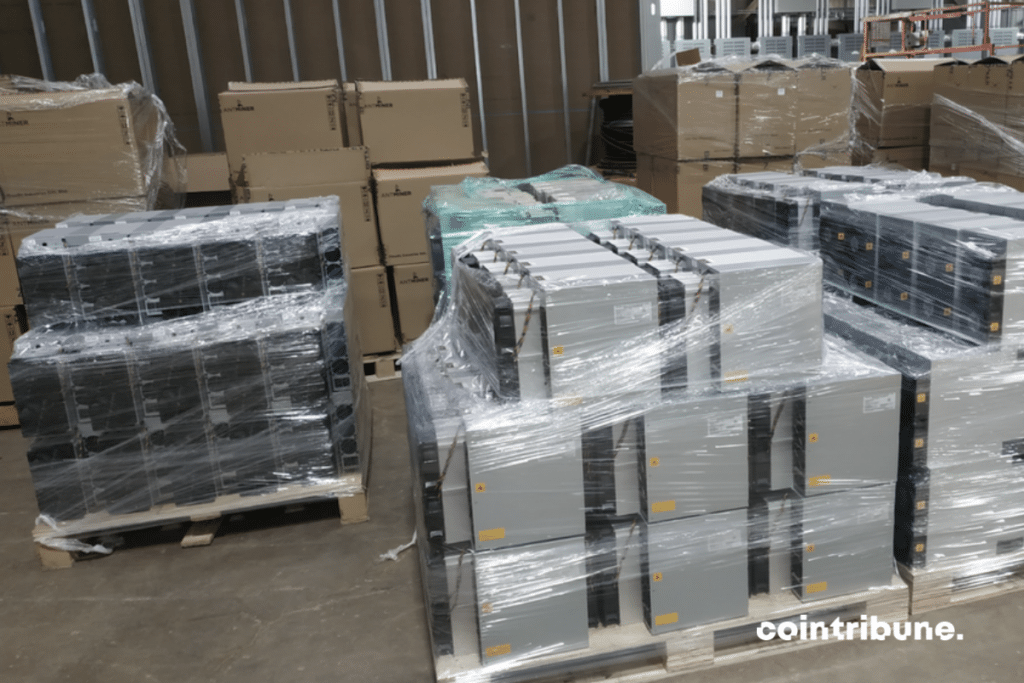Petit aperçu de ce que représente l’inflation des prix des denrées alimentaires au Nigeria entre février 2023 et février 2024.
— L'Afrique parle Bitcoin (@Afrique_Bitcoin) March 6, 2024
🤯 pic.twitter.com/EoGkizLMIy
A
A
Bitcoin - Exodus of American Miners?
Thu 14 Mar 2024 ▪
6
min read ▪ by
Getting informed
▪
Mining
A detrimental bill for the U.S. bitcoin industry has made its way to the U.S. Congress. Are we on the brink of a new exodus?

A Rerun of the Chinese “Ban”?
There was a time when China provided over 60% of the Bitcoin network’s energy. This dominance has significantly waned following the Chinese government’s “ban”. It was just under three years ago.
At the time, energy consumption fell by 65% in just two months. It took nearly a year for the hashrate to return to its peak.
Today, the world’s largest pool (Foundry) is based in the United States, and more than a dozen North American miners are listed on the stock exchange. This includes Cleanspark, Riot, and BitFarms. Several pools are still based in China (f2pool, Antpool, Binance), but they no longer aggregate a dominant share of the hashrate.
This exodus was a blessing in disguise in two respects. It was good news for Bitcoin’s decentralization. It is important that all miners are not clustered in the same country.
The environment also was thankful. Foundry claims that its clients consume 71% green electricity, or are ESG compliant (through the capture of methane that would otherwise be flared off).
The remainder of the excess hydroelectric energy from China’s Sichuan province (built at a time of over-investment in ghost cities) will eventually power the surge in AI enthusiasm.
Despite the heavy hand of the Chinese government, China still hosts around 20% of the hashrate. The figure has since risen from 200 EH/s to nearly 600 EH/s. As a result, Bitcoin has partially rid itself of its problem with geographical concentration.
The lethal regulation against American miners could change the game by triggering a new exodus.
Biden Threatens Miners
As Brian Morgenstern (Riot) said: “Bitcoin brings freedom to the entire world, just as the United States has promoted it for generations. It makes sense for the bitcoin industry to thrive here.”
Problem is, the bitcoin industry is re-concentrating in North America. Perhaps not for long as the Biden administration aims to impose a 30% tax on electricity for miners.
This tax will apply even to miners who are not directly connected to the national grid. Meaning, those who have settled near wind turbines, the majority of whose current is produced when there isn’t a demand for it.
“A tax on the electricity usage by miners could reduce their activity and the associated environmental impacts”, can be read in the bill.
If adopted, this tax will take effect next year. It will be 10% in the first year, 20% in the second, and 30% from 2027 onwards.
This would certainly be bad news for miner Riot which planned to multiply its hashrate by ten and reach 100 EH/s. However, the balance of power in the U.S. Congress suggests that this law will not pass.
Nevertheless, it would be very good news for the decentralization of Bitcoin. Texan miners already represent more than 10% of the global hashrate. We are even at over 40% for the whole of North America.
The migration of miners towards excess and hydraulic energy sources in South America would be welcome. Miner BitFarm, for example, has recently set up in Paraguay to benefit from the excess electricity of the Itaipu dam.
Many miners are also eyeing Argentina, which also has electricity to spare and, above all, a foreign currency shortage that weighs down the exchange rate of the peso.
An Exodus Would Be Good News
All countries with a chronic trade deficit would do well to roll out the red carpet for bitcoin miners. Not having miners means exposing oneself to a vicious cycle.
Trade deficit => Exchange rate drop => Inflation => Growing popularity of Bitcoin
After all, a country without its own miners is forced to import bitcoins from abroad, which in turn worsens the problem of the trade deficit and everything that follows.
That’s why many countries like Lebanon, Nigeria, or Ethiopia block bitcoin purchasing platforms. What’s currently happening in Nigeria with Binance is a textbook case.
In 2022, Ethiopia imported $23 billion worth of goods and services, against only $11 billion in exports. That’s a trade deficit of $12 billion that is weighing down the local currency.
Hence the country’s recent decision to mine bitcoins with the excess electricity from its gigantic Renaissance Dam. Most Chinese bitcoin miners have already struck deals with the Ethiopian electric company.
Instead of waiting for demand to be there, Ethiopia uses bitcoin as a catalyst to accelerate its economic growth and whittle down its trade deficit.
Many facing a chronic trade deficit would do well to emulate Ethiopia. Because sooner or later, their citizens will turn to bitcoin to shield themselves from inflation.
Capital controls and foreign currency purchase limits always end up leading to an emerging parallel exchange rate, heading straight towards hyperinflation.
Nations with the highest inflation rates should prioritize welcoming bitcoin miners.
Maximize your Cointribune experience with our "Read to Earn" program! For every article you read, earn points and access exclusive rewards. Sign up now and start earning benefits.
A
A
Bitcoin, geopolitical, economic and energy journalist.
DISCLAIMER
The views, thoughts, and opinions expressed in this article belong solely to the author, and should not be taken as investment advice. Do your own research before taking any investment decisions.